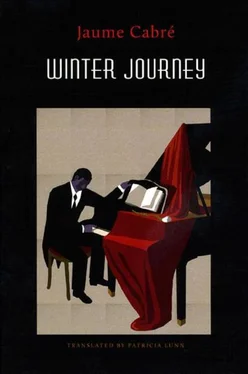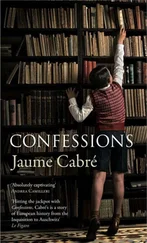"That's obvious. They were far and away the most valuable."
The monsignor took a bite of fish and chewed it unenthusiastically.
"Would they really kill you?"
"We can help each other. What does zero, one, two, three mean?"
"You want Grossman by the balls, don't you?"
Saulnier smiled, his fork in the air. He went back to eating. Monsignor Gaus made sure there was no waiter hanging around and took an envelope out of the pocket of his jacket. He put it in front of Saulnier, who wiped his lips with his napkin, put it on the table, and extended his fingers towards the envelope. He opened it and took out some photos. Four photos. When he realized what they showed, he quickly put them back in the envelope so that no wandering eye could see what it shouldn't see. it seemed to Monsignor Gaus that Saulnier had turned a little pale. Saulnier put the envelope in his pocket. He let a few seconds go by. Obviously, he was impressed by what he'd seen. A thousand centuries later, tapping his pocket, he said, "How do you know? How do you know that's him?"
Surprisingly, the negotiations were finalized in the offices of the Musei e Gallerie more rapidly than anyone expected. The celebration was in the Santa Clara salon. Cardinal Grimaldi, of the Pia Instituzione, radiated happiness as he made small talk, killing time, with the two notaries; the one hired by the Nasjonalgalleriet of Oslo and agreed to by the Vatican and the chief notary of Vatican City. When he saw Monsignor Gaus come in, impassive, escorted by a mute Walzer and a silent Lambertini, the cardinal went to embrace him. 1 haven't been this happy in eighteen years, he said. Gaus calculated that it must have been eighteen years ago when the Holy Father had told him he was making him a prince of the Church. Cardinal Grimaldi offered conventional congratulations to the other members of the team and they all fell silent. The ceremony had to be brief because the pianist who'd been hired to play some Chopin and things like that had tragically and unilaterally annuled the contract, despite having collected a five percent advance. The act itself was over in no time, because it consisted of nothing more than the Norwegian notary and the chief notary certifying that three works had been returned to their legal owners: Pintoricchio's The Coronation of the Virgin, Caravaggio's The Descent from the Cross and Rembrandt's The Philosopher, the most emblematic of the three because of its incalculable value if it were ever to reach the illegal market. A week earlier, the Vatican's experts had certified both their authenticity and their perfect condition.
"Monsignor," His Eminence confessed, "if it weren't for the fact that we have no interest in material gain, 1'd be tempted to see to it that you were well rewarded for your intervention on behalf of the coffers of the Vatican."
Monsignor Gaus bowed his head, humbly. It was inappropriate to speak of compensation. But he discreetly suggested to the cardinal that he might think of granting a promotion to his lay colleague, Lambertini, or adding a bonus to his fee.
He'd never been in the presence of Pierre Grossman. He'd never even seen a picture of him. Pierre Grossman was discretion personified. One of the richest men in Europe, he lived in a kind of voluntary exile, dedicated to the preservation of his fortune and the supervision of the many businesses that made it possible, and to paying the losses occasioned by his wife's passion, a management agency that she managed very badly.
He hadn't imagined him like this. Grossman was wearing a jacket of a strange reddish color, which didn't look bad on him. He wore his white hair very short and the skin of his face wasn't tanned by the sun or the snow, but unevenly pale. It was impossible to tell how old he was.
They were in a suite in a Geneva hotel that had been decorated in a hurry. Unaccompanied, one on either side of the table, they sat at the same time. The monsignor wanted to spend as little time as possible across from that man whose eyes he found it hard to meet, because they bored into him like diamond drills. So, he got down to business and took out the envelope. Grossman took it and removed the photos, without bothering to hide them. He looked at them one by one, impassive, without showing any emotion.
"The negatives?"
"They're in the envelope. But these days that doesn't mean anything."
"So what do you suggest?"
"I'll consider the whole matter of the photos to be a secret of the confessional."
"1 don't give a damn about your secret of the confessional, Monsignor."
"1'm a priest. You must know what the term implies."
"1 blow your secrets of the confessional," now he was looking him patiently in the eye, "out my ass. Can I say it any plainer than that?"
"Then you can just go ahead and kill me now."
"How many people know?"
"The detective 1 hired and 1 myself."
"Who's the detective?"
"He's dead."
"How do 1 know he's really dead?"
"There's proof. A gas explosion in the hotel where he was staying." He passed him a sheet of paper. "Here's the information."
Pierre Grossman took the paper, looked over it calmly, folded it and put it in his pocket.
"Nobody else?" he said.
"Nobody else."
They didn't shake hands or say goodbye. They simply parted forever. Geneva was freezing and the monsignor, who had no desire to play tourist, went back to the Vatican immediately. In any case, he had a good reason for not staying away from home too long.
The entire room was dominated by dark ochres and a wonderful light, on the right, which was a splash of sun against the window. How 1 would have liked to be that peaceful man who spends his days reading, studying, wondering and thinking, now about God, now about the big questions, the Gran lnterrogatori, who am 1, where did 1 come from, where am 1 going. And after a frugal repast, to return to the books and learn the wisdom hidden there and be a small lantern, small but a lantern, to light the way of the Church. How 1 would like that. Instead I've been called to watch over the Church's material goods, l can rarely have a frugal meal, l can never while away the time with a good, fat book in my hands, and I'm not happy. My God, how 1 would like to be that philosopher.
Because Monsignor Gaus couldn't be that, he had to be content with having the painting hanging on the wall of his private gallery. For the first month, the monsignor spent a good hour every day sitting there, in front of the Rembrandt, looking at all of its details, trying to breathe in the the odor of some brush stroke snuffed out by the passage of time. Next to the Rembrandt, on the same panel of the wall, hung Leonardo's unfinished Saint Jerome. And in the same room, but on the opposite wall, Modest Urgell's The Cemetery, a huge, melancholy, perfect work, which he hadn't tired of loving since it disappeared for a few months from the Museu Dali fifteen years ago. In the other room, the king of the paintings was Fra Filippo Lippi's The Coronation of the Virgin, a charmer with colors that were somewhat dark but extraordinarily warm. He breathed in, full, satisfied, almost happy, for on his walls rested some of his great and eternal loves. He couldn't maintain this pleasurable state for long, because the bell rang three times-which called up a vague and distant memory.
Yves Saulnier went into the book-filled library room and waited patiently for the monsignor to return with a tray of coffee so steamily aromatic that it was entrancing. After the first sip, he took the envelope out of his pocket and put it on the coffee table.
"This is yours," he said.
Monsignor Gaus picked it up and checked the contents. The first photo, the most horrifying, showed a baby in a crib with its face destroyed from a bullet shot at close range. A little puff of skyblue smoke was the sole, useless witness to that horrible crime. The monsignor forced himself to look at all of them, despite their rawness. Two more photos of the child and then one presumably of the mother, sitting on a sofa with her head thrown back and her mouth destroyed, also by a bullet. The mother in a housecoat. In her lap, a pretty and hopeful bouquet of flowers that she was holding in her clenched, dead hands. And two or three other photos showing details of that horrifying double murder carried out in a room in a maternity clinic.
Читать дальше












